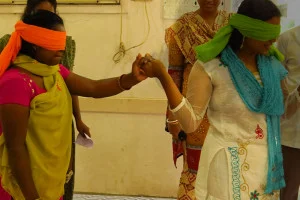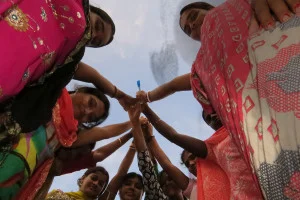How Tafteesh has been breaking human trafficking barriers since 2013.
In 2013 a group of advocates against human trafficking noticed an alarming pattern. A combination of weak interstate communication and a non-descript legal framework against human trafficking meant that a large number of traffickers were getting away scot-free. The same perpetrators who were abducting, transporting and selling victims were roaming the country free waiting to pounce again
Tafteesh action research study in 2013 that looked into the effectiveness of the criminal justice system revealed that the Indian legal framework with respect to trafficking is severely flawed. Notwithstanding the large collection of statutes pertaining to trafficking causing confusion for enforcement agents, the content of such statutes creates further obstacles. The Immoral Traffic (Prevention) Act 1956 (ITPA) lays down the legal framework for trafficking in India. State governments have not utilized the regulation to implement specialized courts for trafficking as intended and the legislation is rarely used as a means to prosecute traffickers. This is because the act only penalises the offence of trafficking if it is shown that the survivor is used for the purpose of prostitution rnrnThe lack of attention that trafficking receives across India, from government bodies and local communities alike, is reflected in police treatment of cases and investigations. As a low profile case, it is not within the interests of police to follow up on investigations and for reasons described earlier, even when an officer wishes to do so, there are monetary reasons why it is not possible. The lack of institutional incentive, coupled with the extreme prejudices existing amongst police and other authorities, means that investigations are often very poorly executed. It has been observed that across various roles within the criminal justice system, each individual does as much as they believe is within their remit to do. For example, a magistrate prosecuting a brothel owner may not think it appropriate to question the investigation of the source trafficker. With no one prepared to question matters beyond their assumed responsibility, it is unsurprising that the ‘full story’ is rarely established.
As a result, when/if the case eventually reaches the courts (with less than 5% reaching this point) the material that lawyers are left to work with is dismal. Cases have not been investigated properly, vital information such as names, dates and locations have been omitted for unknown reasons and often statements have been procured under some form of coercion. This leaves the prosecution with very little on which to build a case and the impossible task of convincing a judge that there is a case worth hearing.
Thus, Sanjog activated Tafteesh, a program formed with the sole purpose of filling in these legal and systemic gaps that encouraged and enabled human trafficking. The Tafteesh initiative collaborates with the criminal justice system, social welfare systems and rehabilitation systems to pursue justice for survivors of human trafficking.
Tafteesh has formulated five approaches aimed at improving justice for survivors.
Approach 1: Centrality of Survivors
This approach is aimed at ensuring survivors remain the central focus point of the trafficking case. It is essential that survivors have a full understanding of their rights, make their own decisions in proceedings, are kept up to date with the progress of the case and are empowered by the system.
Approach 2: Case-Based Advocacy
This approach promotes the benefits of using real-life examples of human trafficking cases to demonstrate flaws in the criminal justice system and campaign for improvements in conditions. Through analysis of previous legal proceedings and communications with survivors and their families, Tafteesh has been able to establish where the system is going wrong and identify the areas needing improvements.
Approach 3: System Diagnosis
This approach looks at diagnosing the system itself. Through studying each stage of the Criminal Justice System, Tafteesh is able to identify where the failures occur and diagnose the problems. Reviews of interview techniques, rehabilitation decisions and reintegration programs are essential to establish effectiveness throughout the process. This approach involves communication and cooperation with each professional that plays a part in the Criminal Justice System, including police officers, lawyers, judges and magistrates.
Approach 4: Building Linkages
This is an extremely important approach that focuses on building bridges between each stakeholder involved in human trafficking. Every institution, NGO, authority, profession and individual must cooperate and coordinate their efforts to improve conditions. If such stakeholders continue to refuse to work together, the system will never work as a whole. This approach includes improving interstate investigation as discussed previously. By bringing together the investigations undertaken at the source and destination points, the quality of the investigations and the legal proceedings will be notably higher.
Approach 5: Judicial Activism
This approach focuses on assisting survivors to commence legal proceedings. Tafteesh works together with survivors and lawyers to prepare strategize and execute effective legal proceedings..Tafteesh has noted that successful legal outcomes can lead to positive communications amongst rural communities promoting the benefits of commencing legal proceedings against traffickers. When a successful case is discussed within a community, this is likely to encourage other survivors to come forward and have the confidence to consider legal action.
Over the last 8 years, Tafteesh has operated as a consortium of NGOs, community-based organizations and survivor groups to consolidate inter-state coordination on case management.
The program’s primary goal is to advocate for the accurate implementation of anti-trafficking law. On the same note, Tafteesh is equally focused on making victim compensation schemes more accessible for survivors. As an organization that has been relentlessly fighting the evils of trafficking, Sanjog welcomed a group effort that aimed to pull the plug on these heinous crimes. Most importantly Sanjog is too familiar with the stigma and ‘shame’ that a survivor experiences as they try to rejoin society. Therefore, utilising the legislation against trafficking and making compensation schemes easier to access became a very important battle cry for Sanjog.
Tafteesh operates to amplify the collective voice of survivors for advocacy, capacity building and awareness-raising. A dirty mix of stigma in their communities, threats, political corruption, and police negligence inevitably rendered survivor cases useless in the past. There was very little accountability from the legal and policing system. Tragically, this mix of systematic neglect and ambiguous legal policy allowed traffickers to continue their operations without having to look over their shoulders.
Tafteesh reached its first landmark in 2017 after 4 years of relentless pursuit for justice. Finally, the program had pushed for some kind of systematic response towards trafficking. Law enforcement agencies began leveraging clauses from pertinent laws to investigate sex trafficking crimes. These clauses had always existed before but were finally being implicated in court to deliver justice. Finally, the impenetrable armor that continuous systematic neglect had adorned upon the traffickers had been cracked.
Beyond fair legislation, Tafteesh also had a far-reaching impact on compensation schemes and victim care. District administration in West Bengal issued health directives granting survivors free psychological and physical treatments. Not only were traffickers being punished, but survivors were finally getting the treatment they deserved. It is next to impossible for survivors to reintegrate with society without any kind of psychological help. These treatments began to unlock years of trauma and served as a great therapeutic release.
More importantly, to fully integrate back into society, numerous survivors successfully received victim compensation through legal processes. In the past, even though compensation schemes were set up by the government, survivors do not always receive their fair share. This accurate and deserved delegation of compensation to survivors came as a welcome change.
Now, Tafteesh is one of the major contributors to the anti-trafficking effort in India. In 2018, Sanjog, through Tafteesh was a key stakeholder in the process of drafting and advocating for the national Trafficking of Persons Bill. In the state of West Bengal, Tafteesh’s efforts have strengthened the social welfare system. More importantly, it has raised awareness about the importance of legal reform when it comes to human trafficking. rnrnIn the many years to come, Tafteesh will continue to be a voice for the voiceless. Tafteesh will continue to strive to provide legal assistance to victims across the nation. rnIf you are interested in the cause and raising awareness around human trafficking, visit the Sanjog webpage here to join our programs. Take your stand now!
Team Sanjog
|
Thursday
,
July 22, 2021


